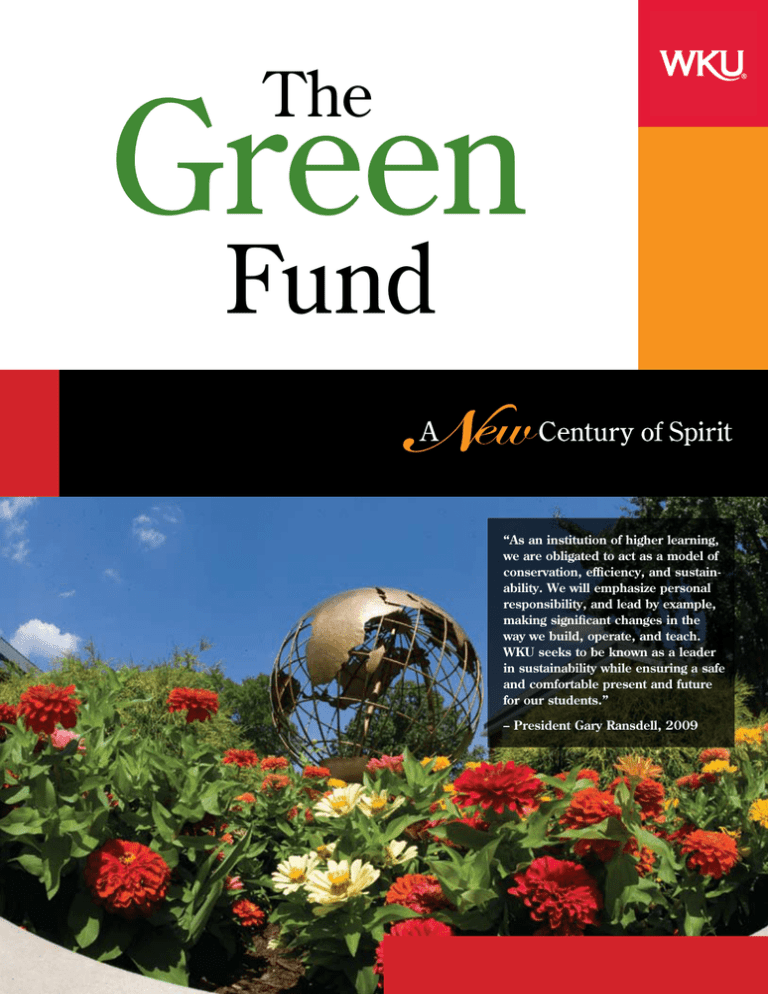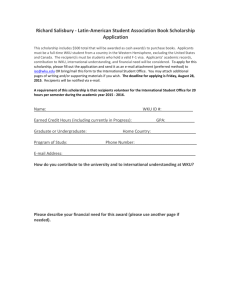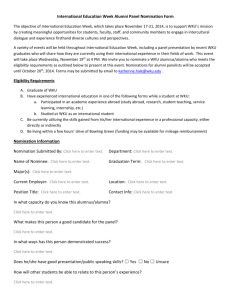Green Fund The
advertisement

The Green Fund “As an institution of higher learning, we are obligated to act as a model of conservation, efficiency, and sustainability. We will emphasize personal responsibility, and lead by example, making significant changes in the way we build, operate, and teach. WKU seeks to be known as a leader in sustainability while ensuring a safe and comfortable present and future for our students.” – President Gary Ransdell, 2009 Sustainability projects at WKU are transforming the campus, curriculum, and educational experiences of students. Our campus and community are being used as a living laboratory where innovative solutions are put into practice. This model involves students in coursework, research, and community projects that tackle real-life problems related to sustainable development. Through these initiatives, our students are developing the technical, professional, and leadership skills they will need to meet the complex global challenges of this century. By incorporating sustainability concepts in all aspects of the curriculum and campus operations, we are preparing students to meet the complex challenges of our times. The greening of WKU is perhaps the most exciting and important endeavor upon which our University has ever embarked. WKU embraces the important role that institutions of higher education will play in helping our global society transition to a more sustainable future. We are taking up this challenge to help ensure that current and future generations can live well on our planet. Major funding will be required to put vision into practice and achieve major impacts. The Green Fund provides a way for you to support WKU’s sustainability initiatives. President Ransdell leads bike ride to promote a bike friendly campus and community. The Upper Green River Biological Preserve offers opportunities for research and regional stewardship projects. WKU is seeking LEED certification for the new College of Education and Behavioral Sciences building. HOW DOES “GREEN” LOOK AT WKU? • Students are driving campus sustainability initiatives through the GreenToppers, Residence Life, and Student Government Association. Projects include a campus organic farmer’s market, Big Red’s Bikes, “Reduce Your Use” campaign, and move out “Lighten Your Load” donations to local charities. • New degree programs and certificates focusing on energy and environment, sustainable community development, and social responsibility will be offered. • WKU students are working with communities across the globe to create sustainable methods for economic development and natural resource management. Projects are underway in China, Kenya, Ecuador, Peru, Belize, Costa Rica, Nepal, Spain, and other countries. • WKU is seeking LEED (Leadership in Energy and Environmental Design) Certification for the new College of Education and Behavioral Sciences currently under construction. • The first small commercial solar electric system in Bowling Green was installed at the WKU ALIVE Center in 2008 as a community demonstration model and for student research. • A team of Engineering students designed and installed a biofuel facility that converts waste oil from campus food services to fuel used in the University Farm’s equipment. • An Innovations in Sustainability Endowment supports studentled projects that improve campus sustainability in energy use and environmental stewardship, and educate students in related areas. • In 2009, Governor Steve Beshear joined with President Gary Ransdell to launch a comprehensive Energy Policy that outlines individual and University responsibility for energy management. The 2008 threeweek shutdown for energy savings between semesters saved the University one million kwh of electricity, 1,112 metric tons of greenhouse gas emissions, and $128,340 in cost avoidance savings. • WKU hosted Sustainability ’09, a conference that highlighted efforts by Kentucky colleges and universities and their local communities to build capacity for a sustainable future. A WKU Sustainability Report details these and many more projects and initiatives now underway. Visit www.wku.edu/sustainability/ for more information. What can I do? The Green Fund allows you to become a part of these vital changes taking place at WKU. Contributions to the fund will provide support in three principle areas: Green campus initiatives are physical projects and operational improvements to reduce the ecological footprint on campus. These include energy retrofits and renewable energy building applications; responsible purchasing programs, waste reduction and recycling programs; storm water catchment for landscape irrigation, rain gardens, and green roofs; alternative modes of transportation; and more. Curriculum redesign includes course enhancement and faculty development initiatives for sustainability across the curriculum. Funds will support new facilities and centers for teaching sustainable methods and technologies, student scholarships, endowed faculty positions, international programs in sustainability, speakers, conferences, curriculum revisions, and more. Community engagement and research initiatives provide students, faculty, staff, and community partners the opportunity to apply sustainable methods and technologies in real-life settings. Examples include the sustainable agriculture and energy demonstration and teaching project at the WKU Farm, student designs for the local Habitat for Humanity EcoVillage, a Nature Explore Classroom being developed with the WKU Child Care Consortium, and the development of an Ecodorm for nontraditional students by Residence Life. WKU seeks to become a leading university with international reach in sustainability and your support will make the difference. Your contributions to the Green Fund will create a lasting legacy and help ensure a sustainable future for generations to come. The Green Fund



